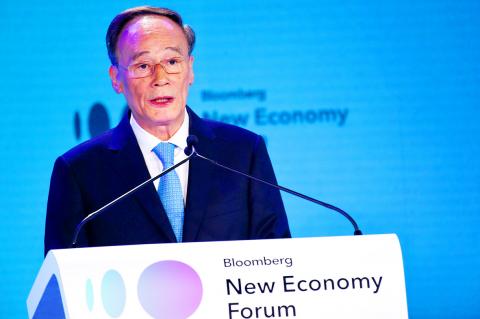The US and China are to hold a delayed top-level security dialogue on Friday, the latest sign of a thaw in relations, as the Chinese vice president said Beijing was willing to talk with Washington to resolve their bitter trade dispute.
The resumption of high-level dialogue, marked last week by a telephone call between US President Donald Trump and Chinese President Xi Jinping (習近平), comes ahead of an expected meeting between the two at the G20 summit in Argentina later this month.
It follows months of recriminations spanning trade, US accusations of Chinese political interference, the disputed South China Sea and Taiwan.

Photo: AFP
China and the US have both described last week’s telephone call between Trump and Xi as positive. Trump predicted that he would be able to make a deal with China on trade.
In a concrete sign of the unfreezing, the US Department of State said that US Secretary of State Mike Pompeo, US Secretary of Defense James Mattis, Chinese State Counselor Yang Jiechi (楊潔篪) and Chinese Minister of National Defense Wei Fenghe (魏鳳和) would take part in diplomatic and security talks in Washington.
China last month said the two sides had initially agreed “in principle” to hold a second round of diplomatic security talks last month, but that they were postponed at Washington’s request amid rising tensions over trade, Taiwan and the South China Sea.
Mattis had been due last month to hold talks with Wei in Beijing, but those plans were upended after Washington imposed sanctions on China’s People’s Liberation Army for buying weapons from Russia.
Mattis did meet Wei in Singapore on Oct. 18 and told him that the world’s two largest economies needed to deepen high-level ties to reduce the risk of conflict.
Speaking in Singapore yesterday, Chinese Vice President Wang Qishan (王岐山), who is close to Xi, reiterated China’s readiness to hold discussions and work with the US to resolve trade disputes as the world’s two largest economies stand to lose from the confrontation.
“Both China and the US would love to see greater trade and economic cooperation,” Wang told the Bloomberg New Economy Forum in Singapore.
“The Chinese side is ready to have discussions with the US on issues of mutual concern and work for a solution on trade acceptable to both sides,” he said. “The world today faces many major problems that require close cooperation between China and the United States.”

TRAGEDY STRIKES TAIPEI: The suspect died after falling off a building after he threw smoke grenades into Taipei Main Station and went on a killing spree in Zhongshan A 27-year-old suspect allegedly threw smoke grenades in Taipei Main Station and then proceeded to Zhongshan MRT Station in a random killing spree that resulted in the death of the suspect and two other civilians, and seven injured, including one in critical condition, as of press time last night. The suspect, identified as a man surnamed Chang Wen (張文), allegedly began the attack at Taipei Main Station, the Taipei Fire Department said, adding that it received a report at 5:24pm that smoke grenades had been thrown in the station. One man in his 50s was rushed to hospital after a cardiac arrest

A car bomb killed a senior Russian general in southern Moscow yesterday morning, the latest high-profile army figure to be blown up in a blast that came just hours after Russian and Ukrainian delegates held separate talks in Miami on a plan to end the war. Kyiv has not commented on the incident, but Russian investigators said they were probing whether the blast was “linked” to “Ukrainian special forces.” The attack was similar to other assassinations of generals and pro-war figures that have either been claimed, or are widely believed to have been orchestrated, by Ukraine. Russian Lieutenant General Fanil Sarvarov, 56, head

SAFETY FIRST: Double the number of police were deployed at the Taipei Marathon, while other cities released plans to bolster public event safety Authorities across Taiwan have stepped up security measures ahead of Christmas and New Year events, following a knife and smoke bomb attack in Taipei on Friday that left four people dead and 11 injured. In a bid to prevent potential copycat incidents, police deployments have been expanded for large gatherings, transport hubs, and other crowded public spaces, according to official statements from police and city authorities. Taipei Mayor Chiang Wan-an (蔣萬安) said the city has “comprehensively raised security readiness” in crowded areas, increased police deployments with armed officers, and intensified patrols during weekends and nighttime hours. For large-scale events, security checkpoints and explosives

PUBLIC SAFETY: The premier said that security would be tightened in transport hubs, while President Lai commended the public for their bravery The government is to deploy more police, including rapid response units, in crowded public areas to ensure a swift response to any threats, President William Lai (賴清德) said yesterday after a knife attack killed three people and injured 11 in Taipei the previous day. Lai made the remarks following a briefing by the National Police Agency on the progress of the investigation, saying that the attack underscored the importance of cooperation in public security between the central and local governments. The attack unfolded in the early evening on Friday around Taipei Main Station’s M7 exit and later near the Taipei MRT’s Zhongshan